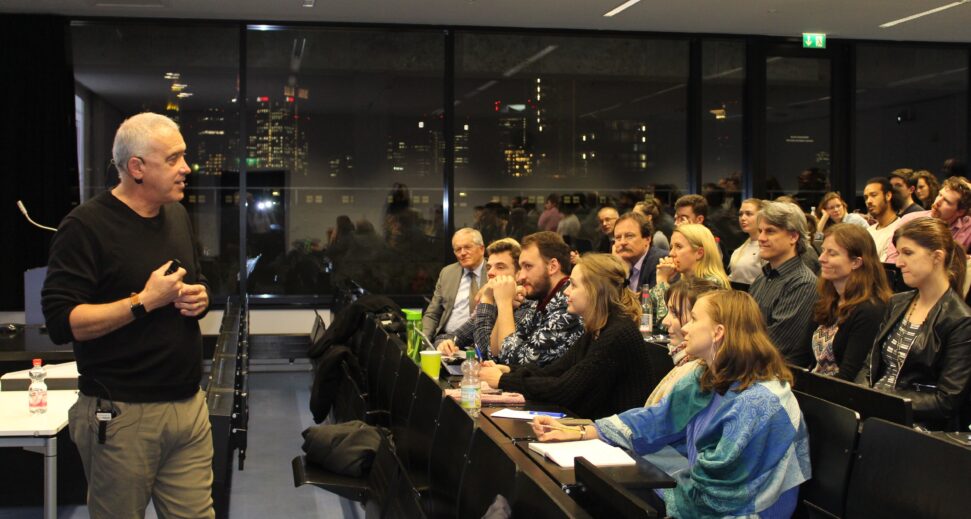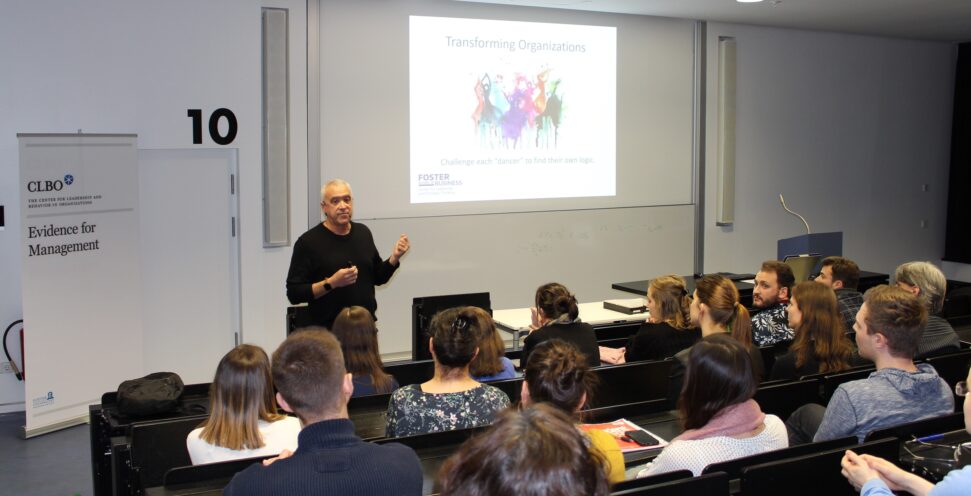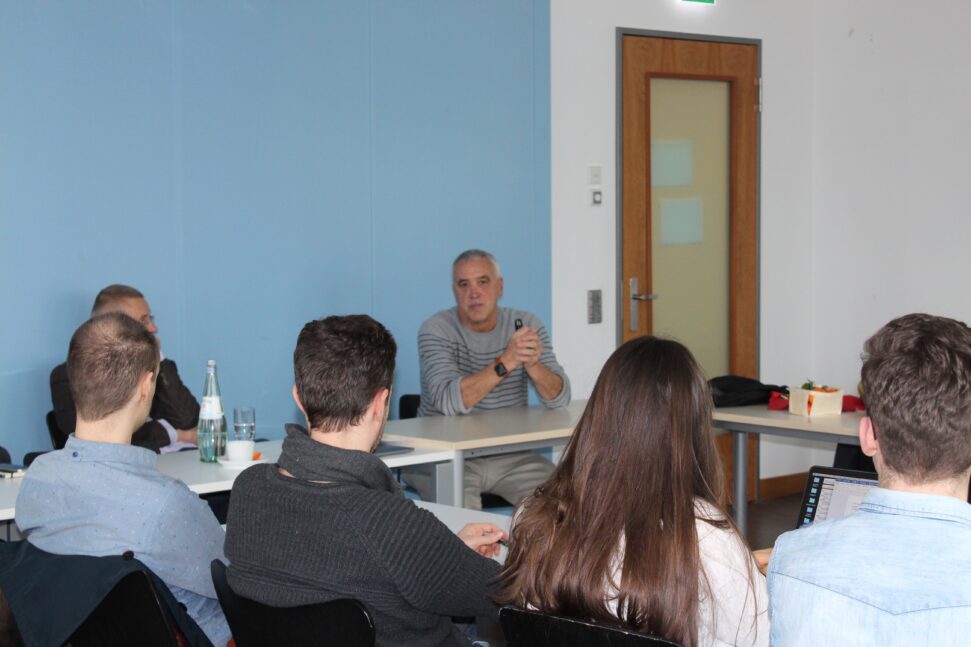News & Events
News & Events-Archiv 2020
December 19th, 2020 How are leaders’ well-being and their leadership behaviors related?
Does the health of leaders have an impact on their leadership behavior? And can the way leaders lead also have an effect on their well-being?
To answer these questions, researchers from the Goethe University in Frankfurt, together with researchers from the Christian Albrechts University in Kiel and the University of Koblenz-Landau, conducted a meta-analysis to summarize previous findings on the relationship between leadership behavior and leader well-being.
The results of the review (95 effect sizes; N = 12,617) confirm a clear relationship between how well a leader feels and how he or she behaves toward his or her employees. Different correlations of constructive and destructive leadership behaviors with different forms of well-being (for example, positive vs. negative) can be identified.
Conclusion: leaders who are healthy lead better and leaders who lead better are also healthier.
Interested in the results? Here is a factsheet with the key findings.
Want to know more about the study and also the practical implications? Here you can find an interview with Dr. Antonia Kaluza from the Goethe University Frankfurt (in German).
December 18th, 2020 Homeoffice & COVID-19 – neue Erkenntnisse aus der Sozialpsychologie
Homeoffice oder auch Telearbeit genannt, also das Arbeiten außerhalb eines zentralen Arbeitsplatzes, ist mittlerweile aus dem Arbeitsalltag nicht mehr wegzudenken. Und gerade momentan ist es besonders wichtig, um Kontakte zu reduzieren und damit die Ausbreitung des Corona-Virus zu verlangsamen. In einer Studie der Sozialpsychologie der Universität Frankfurt wurden über 300 Mitarbeitende aus verschiedenen deutschen Unternehmen befragt, wie sie verschiedene Vor- und Nachteile vom Homeoffice einschätzen. Ein kurzes Interview mit den beiden Autoren der Studie, Prof. Dr. Rolf van Dick und Dr. Antonia Kaluza, zu den wichtigsten Erkenntnissen dieser Studie finden Sie hier.
December 9th, 2020 How do managers lead their employees in a health-oriented manner in the digital context?
To answer this exciting question, researchers at Goethe University Frankfurt conducted a qualitative survey of 87 leaders between August and September 2020. You can find the interesting results of this study here.
Are you interested in supporting the research and contributing to insights on the topic of virtual leadership? Then you are cordially invited to participate in the current survey (in German only). Click here to access the survey.
December 4th, 2020 Home office und Corona
Home office, telework or work from home - these terms have become an integral part of everyday work. Especially in times of the COVID-19 pandemic, these forms of work play an important role in minimizing the risk of infection and still maintaining work. However, home office does not only have positive consequences, many employees also perceive disadvantages, such as reduced (personal) contact.
To find out how the assessment of the advantages and disadvantages of telework changed during the COVID-19 pandemic, 331 employees (average age 35 years, 27% male) in Germany were interviewed. Some of the participants completed the survey before the restrictions in March 2020 and some after extensive restrictions (such as wearing mouth and nose covering, curfews) were introduced.
A summary of the results can be found here.
Conclusion: The identification with the work team, i.e., the psychological attachment to other colleagues, is important - especially for colleagues in the home office and especially when this form of work cannot necessarily be chosen voluntarily (as is partly the case during the COVID-19 pandemic, for example).
The results show that in the current situation, especially those reporting a low level of identification with their work team perceive more disadvantages of working from home the more they work from home compared to those who feel closely connected to their colleagues, i.e., report a high level of team identification.
Interested in supporting our research? We are conducting another survey - anyone can participate, whether they work at home or not.
Here is the link to the English survey.
Here is the link to the German survey.
February 19th, 2020 Visit and talk from Prof. Bruce Avolio
 Prof. Dr. Bruce Avolio, regarded as one of the world’s leading experts in the field of leadership, has visited the Center for Leadership and Behavior in Organizations (CLBO) in February 2020. He is one of the most cited researchers in industrial and organizational psychology. He is best known for his work on transformational leadership, but has also done research on other topics. During his stay, he held a lecture for scientists and practitioners titled “Understanding the First Principle for Successful Organizational Transformation: Change Occurs One Person at a Time”. In the lecture, he explained principles of organizational change and applied them to actual examples of real life organizations. This talk was well visited by many interested people who asked questions and discussed various topics with him. Bruce Avolio also took part in a CLBO Small Group Meeting in which he gave another talk on “Authentic Leadership, Employee Voice and Organizational Sustainability”. In addition, he had many personal meetings with PhD students, research associates and professors to discuss and give feedback on current research projects.
Prof. Dr. Bruce Avolio, regarded as one of the world’s leading experts in the field of leadership, has visited the Center for Leadership and Behavior in Organizations (CLBO) in February 2020. He is one of the most cited researchers in industrial and organizational psychology. He is best known for his work on transformational leadership, but has also done research on other topics. During his stay, he held a lecture for scientists and practitioners titled “Understanding the First Principle for Successful Organizational Transformation: Change Occurs One Person at a Time”. In the lecture, he explained principles of organizational change and applied them to actual examples of real life organizations. This talk was well visited by many interested people who asked questions and discussed various topics with him. Bruce Avolio also took part in a CLBO Small Group Meeting in which he gave another talk on “Authentic Leadership, Employee Voice and Organizational Sustainability”. In addition, he had many personal meetings with PhD students, research associates and professors to discuss and give feedback on current research projects.



January 4th, 2020 Lecture: Understanding the First Principle for Successful Organizational Transformation: Change Occurs One Person at a Time
Understanding the First Principle for
Successful Organizational Transformation:
Change Occurs One Person at a Time
Prof. Bruce J. Avolio
The CLBO Leadership Lectures
Tuesday, 18th February 2020,
at Goethe University Frankfurt, Campus Westend, Lecture Hall (Hörsaal) HZ 10, 18.30h – 20.00h,
followed by a reception
To the degree the horizon for when the leaders of an organization perceive the need for their organization to change is longer then the time horizon dictated by their competitors, the probability of being able to change and sustain success is substantially reduced. It is therefore incumbent upon organizational leaders to match the evolution of change occurring in their external markets by promoting a continuous readiness for transformation. We begin our examination of organizational transformation with an assumption that all organizational leaders must remain vigilant to the ongoing need to evolve and transform, not when platforms are burning, but when they are just contemplating how to create those platforms. We also make a distinction between change efforts and transformation, with the latter representing fundamental change in how organizational members identify with and construe their roles in achieving and sustaining success in their organization. The ultimate goal for this presentation is to demonstrate the first principle of organizational transformation. Specifically, all employees must fundamentally alter how they each conceive of their organization, in order for their organization to achieve and sustain a successful transformation. We examined in a series of studies the 4 states that organizations navigate through to transform, and the key mechanisms comprising those states that promote a successful organizational transformation. Specific examples of how leaders have successfully navigated through change to transform their organization will be discussed and applied to the challenges facing attendee’s organizations.
Prof. Bruce J. Avolio was has published 12 books and over 150 articles on leadership and related areas. In 2018, Bruce was recognized as being among the top 70 most highly cited researchers in the United States in Economics and Business, and among the top 3,000 across all sciences around the globe (Thompson Reuters). He was listed this past year at the #18th spot on the all time most highly cited industrial and organizational psychology researchers over the last 100 years.
This event is organized by the Center for Leadership and Behavior in Organization in the new annual Leadership Lectures series.
Participation in the event and following reception is free of charge. For registration, please send an email to a.kaluza@clbo-frankfurt.org. Registration deadline is February 7th, 2020.
